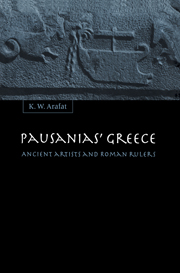Book contents
- Frontmatter
- Contents
- Map of Roman Greece
- Preface and acknowledgements
- List of abbreviations
- Chapter 1 Introduction
- Chapter 2 Pausanias on the past
- Chapter 3 Pausanias on the rulers of Roman Greece 1: introduction, Mummius and Sulla
- Chapter 4 Pausanias on the rulers of Roman Greece 2: Caesar and Augustus
- Chapter 5 Pausanias on the rulers of Roman Greece 3: Nero to Marcus Aurelius
- Chapter 6 Pausanias on Herodes Atticus and other benefactors
- Chapter 7 Conclusions
- Bibliography
- Index of Pausanias passages cited
- Index of other authors and passages cited
- General index
Chapter 7 - Conclusions
Published online by Cambridge University Press: 22 September 2009
- Frontmatter
- Contents
- Map of Roman Greece
- Preface and acknowledgements
- List of abbreviations
- Chapter 1 Introduction
- Chapter 2 Pausanias on the past
- Chapter 3 Pausanias on the rulers of Roman Greece 1: introduction, Mummius and Sulla
- Chapter 4 Pausanias on the rulers of Roman Greece 2: Caesar and Augustus
- Chapter 5 Pausanias on the rulers of Roman Greece 3: Nero to Marcus Aurelius
- Chapter 6 Pausanias on Herodes Atticus and other benefactors
- Chapter 7 Conclusions
- Bibliography
- Index of Pausanias passages cited
- Index of other authors and passages cited
- General index
Summary
Having looked in detail at the text of Pausanias and particularly at his words concerning the leading figures of the later Republic and early Empire, I wish here to stand back from the details in order to look at the overall picture, at what Pausanias actually thought of Rome and all that it had brought to Greece. Also to bring together his approaches to past and present, to assess whether he regards the latter as lesser than the former, whether he denigrates the present better to promote the past; how far he seeks to glorify the past, and how far he ignores the present, following the archaizing tendency in the culture of his age which has repeatedly been stressed in the preceding pages.
Pausanias does not feel negatively towards Rome per se – he had visited Rome and wondered at its sights (8.17.4, 9.21.1), as well as at those of other parts of Italy. In saying that Pausanias does not feel negatively towards Rome, I follow Palm (and others) in supporting Clavier's emendation of the text at 8.27.1, to include epi, with the meaning that the inhabitants were overtaken by ‘disaster under the Roman Empire’ (i.e. as a chronological statement) rather than meaning the ‘disaster of the Roman Empire’. This is an important point for present purposes since, as Palm observes, it has been the key element in any view of Pausanias as anti-Roman.
- Type
- Chapter
- Information
- Pausanias' GreeceAncient Artists and Roman Rulers, pp. 202 - 215Publisher: Cambridge University PressPrint publication year: 1996

